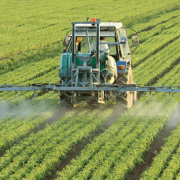Europe grants a temporary extension of the use of glyphosate
The European Commission has announced on Wednesday 29th, in a press release, the decision to extend the authorization of the use of glyphosate for a period of 18 months. Thus, the controversial herbicide may be used until the end of 2017, despite resistance from some EU member countries.
In its statement, the European executive said having “decided to extend the authorization of glyphosate for a limited period, until the European Chemicals Agency published its opinion at the latest at the end of 2017″.
This measure was taken after three postponements. At the last meeting, on 24th June, and despite a simple majority of countries (19) for renewal of approval, the proposal was rejected because the quorum was not reached in terms of population represented (52% vs. 65 % required). Abstention from seven countries, Germany, Italy, Portugal, Austria, Luxembourg, Greece and Bulgaria, blocked any decision. France, the first European agricultural power, abstained in the first two ballots and finally voted against on 24th June.
Brussels has justified this measure by the refusal of state members to “take responsibility” in the subject. A decision, which coincided with a summit in Brussels on the consequences of the departure of the United Kingdom of the EU ( ‘Brexit’), which monopolized all the attention.
So and in the absence of a qualified majority among member states, the Commission has chosen to take the extension of the license, which expired on Thursday, June 30th because of a decision not be adopted before the end of that period that substance, which is present in herbicides, had been banned, disrupting the production system of large European farms, and materializing one of the fears of the main union of European farmers, Copa-Cogeca, which considers that, so far, no there is a viable alternative to glyphosate herbicides.
The Association of European producers of plant protection (ECPA) has said through his spokesman, Graeme Taylor, that, contrary to what one might think, this decision is a disappointment more than a victory for their industry. The reason, the fact that the Commission initially planned to renew the license for 15 years.
Glyphosate is the most widely used herbicide in the European countryside and is present in manufactured herbicides, among others, Monsanto, Syngenta and Bayer. But its effects on health and the environment are controversial and contentious.
Dissenting voices on the effects of glyphosate
The European Food Safety Authority (EFSA) judged at the time as “unlikely” that glyphosate was carcinogenic.
A view contradicts that of the International Agency for Research on Cancer (IARC, for its acronym in English) or the World Health Organization (WHO), who qualified for this component of carcinogenic “likely to man” . However, another recent study by the WHO and the Food and Agriculture Organization (FAO) estimates for his part as “unlikely” that glyphosate is carcinogenic “in humans exposed through food. ”
Among other crop protection products, this substance is present in Monsanto’s Roundup, one of the best selling herbicide in the world.
The use of herbicides with glyphosate widespread since it hit the market in the 1970s and even more with the development of GM crops resistant to the substance, such as RR (Roundup Ready) soy of Monsanto.
Source: Agencies
















